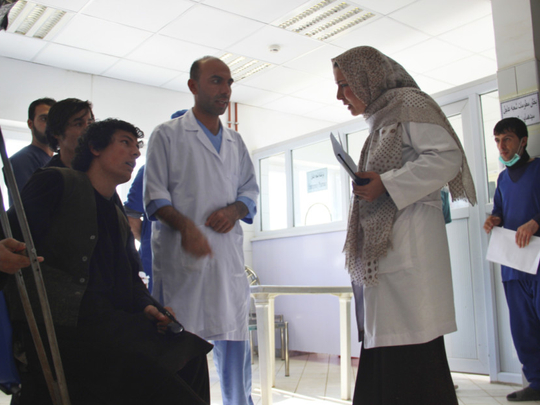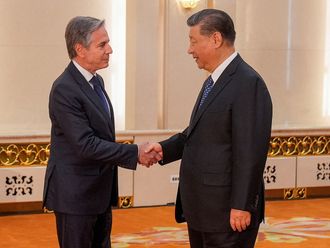
KUNDUZ, Afghanistan
The Taliban controlled the nearby streets and bullets were popping in the dark when Dr Marzia Salam Yaftali’s neighbours in Kunduz City turned to her for help.
Their relative had gone into labour with twins and was having trouble, the streets to the hospital were blocked, and Yaftali was their best hope. With urban battle all around, she took the risk of leaving her two young children at home to try to save three lives.
But on that evening last fall, the doctor did not feel like a hero — she felt guilty. Her place was at Kunduz Regional Hospital, where she was the chief doctor, directing her staff members as they handled a wave of casualties. But they had begged her to stay home, feeling she would be at risk if the Taliban or even the militiamen fighting them found a woman in charge.
“I still struggle with that feeling — why I was not able to come to the hospital that day,” Yaftali said in an interview at the hospital months later. “I am still uncomfortable.”
Kunduz was already known for danger to medical workers after a US warplane bombed its best hospital to ruins during a Taliban siege in 2015, leaving Kunduz Regional Hospital as its only significant care facility.
Stuck at home, Yaftali essentially took over the public relations campaign for a hospital under fire. She spoke to radio stations and newspapers and regularly updated her Facebook page with urgent calls to both sides not to fire on the hospital, and notices to the public about which facilities were still functioning.
“Others in Kunduz were looking for water, and I was after a litre of gas — to make sure I could turn on the generator to charge my phone so I am updated on what is happening at the hospital,” she recalled.
Then, one night around 9 o’clock, she heard a knock at her gate and the voices of her neighbours outside. Their pregnant relative, a 30-year-old named Fatima, was in intense pain and desperately needed help.
Yaftali said she had first examined Fatima, who had travelled to Kunduz from an outlying a district, a couple weeks before and knew that natural birth would be difficult. One of the babies was large and in what she described as “shoulder presentation.”
“I was nervous — how could I go to the house of the neighbour, and their house was just 100 or 200 metres away from mine?” Yaftali said. “On the other hand, if I don’t go to their house, what will the mother do? She came to our area and close to me, and she hoped I would help her, I would take care of her.”
She braved the street, and when she got to the house, Fatima was giving birth on the floor to the first child. The second child, however, was stuck, and the mother was in agony.
Yaftali intervened to try to reposition the baby for a safer delivery. But her patient’s pain was intolerable.
“I don’t have any medical equipment with me — my hands are empty,” Yaftali recalled. “I worked for them like a local midwife. There was no place to do a caesarean or an operation. Professionally, a caesarean was needed.”
The provincial police chief was called, and he sent an armoured vehicle to the house to transport Fatima to the hospital. But the woman’s relatives would not let her go without them, and would not go themselves because of the risk: At the time, civilians were frequently hit by crossfire, and reports of corpses being left on the streets were circulating.
“Their logic was this: We can sacrifice one mother, but we cannot sacrifice several family members by going with you to the hospital,” Yaftali said.
So she sent the police chief’s armoured car back to the hospital to bring drugs and medical equipment, and she tried again to help deliver the baby. But she knew the second infant was lost, and there was little she could do other than try to reduce Fatima’s risk and pain.
Yaftali went back home to her two children, the youngest just 6 months old. And in the morning, after the fighting quieted a little, Fatima was able to go to the hospital for treatment, but with just one of her children alive.
“It was very painful for me. The scene was not tolerable, as I saw a child dying in the womb of the mother, and I was not able to help him, to help him even a bit,” Yaftali said. “That was the darkest night, and I will never forget.” After the Taliban were cleared out, Yaftali returned to her work. Her Facebook page, after a last plea to all the hospital workers who had fled the city to return, returned to her usual dose of medical advice to her readers.
To this day, though, she is racked by remorse.
“The day the fighting quieted down, my suggestion to the hospital and the Ministry of Health was that the first thing I do is resign,” Yaftali said.
The officials turned down her resignation, though, praising her service from home and the fact that she had helped put a system in place at the hospital that had held up even in her absence.












